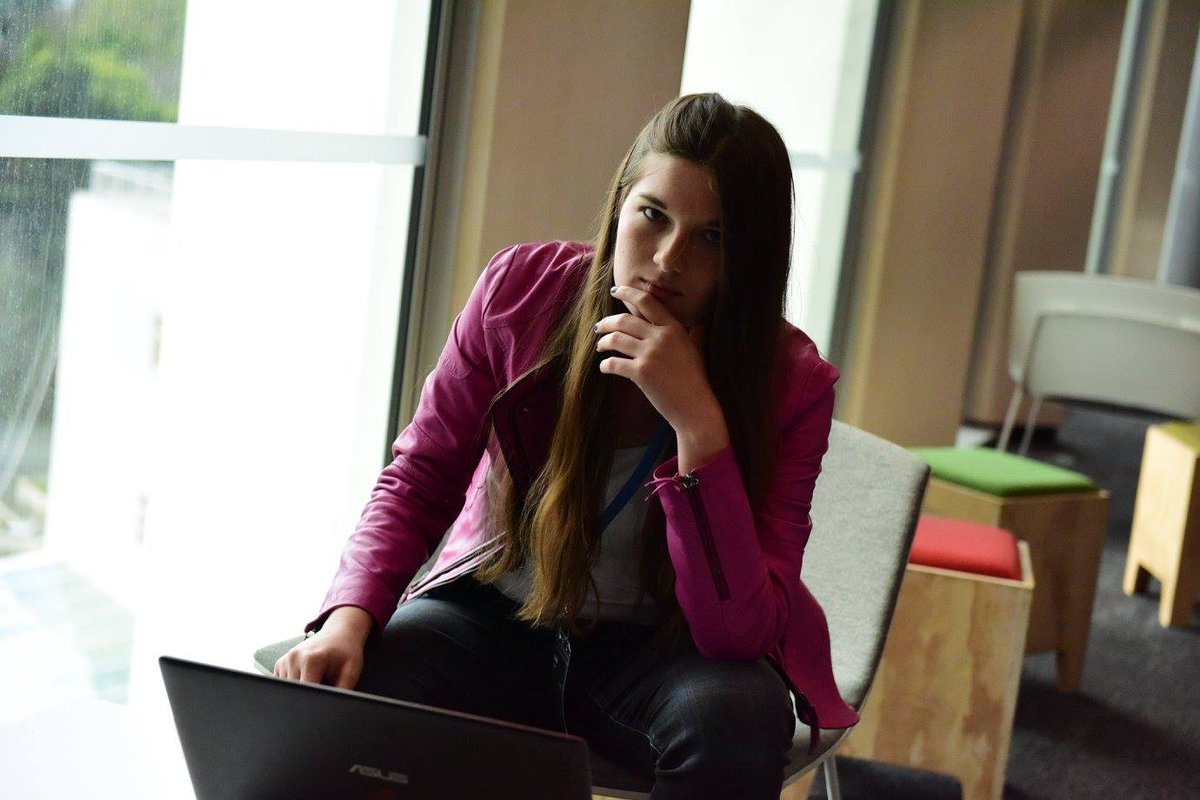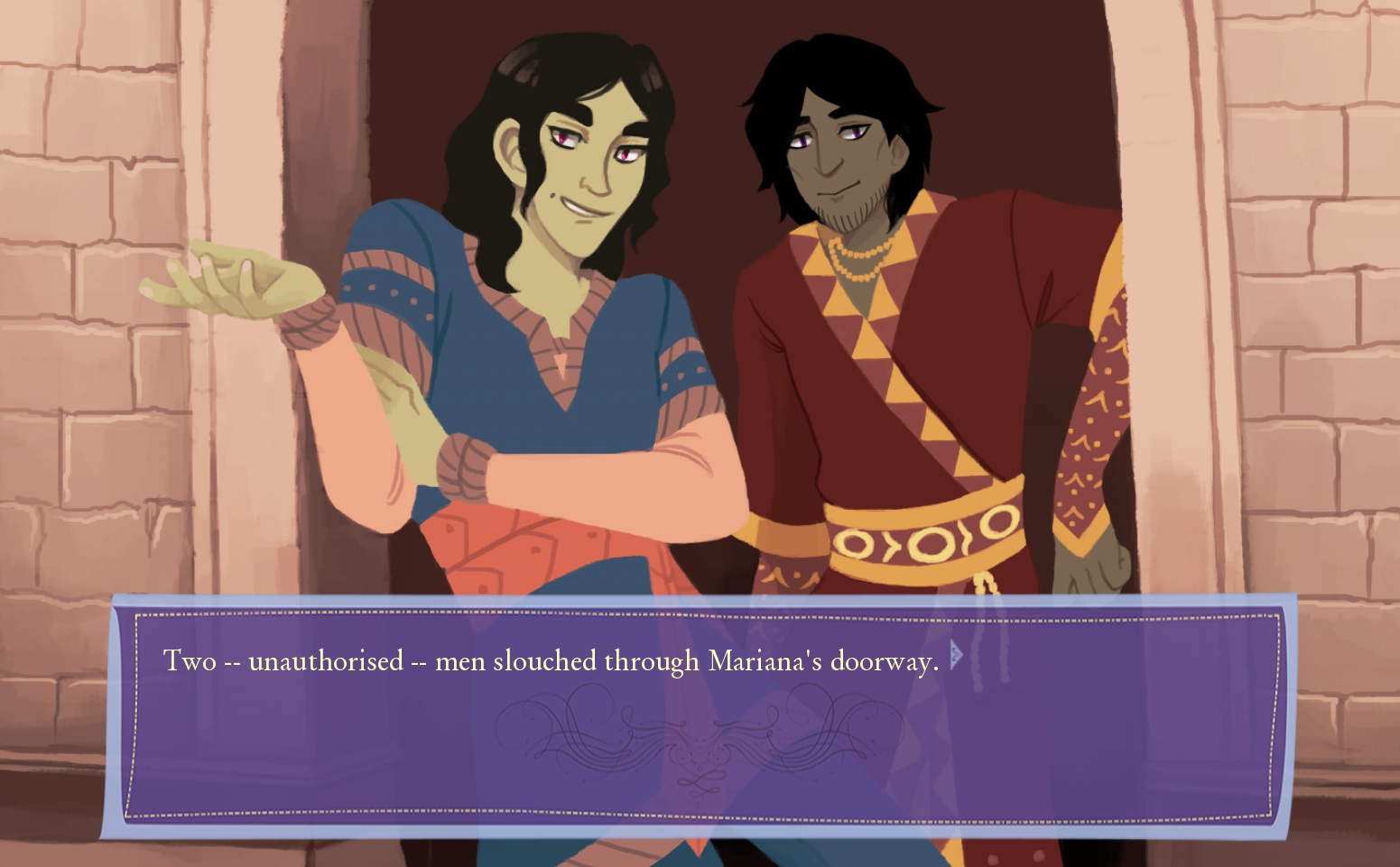Maddi Mackenzie

- Role: Narrative designer
- Location: Auckland, New Zealand
We sat down to chat with Maddi Mackenzie, an independent narrative designer.
QRM: Can you tell us a little bit about who you are and what you do in the games industry?
Maddi: In theory I'm a narrative designer, in practice, I'm a solo developer who makes narrative-focused games. Basically, I make words and branching and story variables happen, but I also have to code them into existence, arrange art for them, and plumb sound archives for appropriate noises. It's a lot!
QRM: How long have you been involved in the game industry, and what projects have you worked on? What are you working on currently?
Maddi: I've been involved in games since about 2013, first dabbling in some projects I never released, then on a visual novel called Inverness Nights from June 2014 to June 2017. Inverness Nights is a break-up game set in 18th century Scotland where you play as Tristram Rose, an immortal tailor in the process of ending his relationship with his boyfriend Alasdair; I made it out of a desire to create a romance game that wasn't about initiating a relationship, and to explore queer isolation along with a few other related themes that don't often occur in games.
Now that's done, I'm working on a simple interactive fiction piece called Captain Dracula. The premise is that you're on a submarine and you learn your Captain is Dracula: what do you do? The themes are maybe a bit simpler than Inverness Nights but I think it'll be a fulfilling experience in its own right. If nothing else, it lets you start a ska band with the Prince of Darkness, which I think is a life goal for a lot of people. I hope it is. If it's not, why not?
QRM: What inspired you to get started in the games industry?
Maddi: Psychonauts; when I was in middle school I played it through and loved it so much that I got involved in the fan community, where I discovered a few of the official forum regulars were into making MUDs or flash games. They made me realise that making games wasn't an inaccessible hobby/job for compsci grads only, so I started going to kids' game development courses.
Unfortunately, I was the sole 'girl' at those courses, so I took a lot of abuse for being there: one time I remember having to look up a picture of the Psychonauts development team and point out Anna Kipnis to get the boys to stop saying women didn't do dev. In the end it was too much, and I set dev aside to spare myself the exhaustion.
Years passed, until in January 2013, I took a university class on game theory. The professor took me aside after the last lesson and said my writing was passionate enough that I should consider pursuing the field to postgrad level, or getting into development. Suddenly those dreams that I'd written off of being involved in games came back, and within a few months, I'd started hanging around the visual novel development community and dabbling in narrative work. I pursued the other side of the equation too; as of a couple of weeks ago I have a Master of Arts in Media Studies, specialising in game theory.
The moral of the story is probably 'follow your heart because it knows what you'll love', but it could also be 'Psychonauts is great oh my god why did I play it cool when I met Tim Schafer earlier this year I should've told him what that game meant to me'. You decide!
QRM: In what ways do you feel your experiences as a queer person manifest in the games you work on, and influence the work you do?
Maddi: The lucky part of being a solo developer is that my games can be as queer as I want in whatever way I want. Mostly I've had very textual queerness so far – Inverness Nights has a 100% queer core cast (2x gay men, 2x bi men, and 1x NB person) and Captain Dracula is a specifically bi interpretation of Dracula – but I think subtextual queerness is valuable, if less visible, too. There are themes and concepts I'm definitely preoccupied with in ways a cis/het person wouldn't be that I think other queer people frequently relate to, like body horror and repression and fighting to preserve your history.
Something I worry about when people talk about representation is that by associating 'good representation' with 'goodness', we're discouraging representation of the difficult thematic/conceptual stuff that defines the current queer experience. While I recognise this work can run the risk of becoming misery tourism for cis/het people, that's the work I'm interested in doing at the moment. I make it in the hope I can provide an outlet for other queer people worried about causing pain, making mistakes, or becoming a villain.
People absolutely need their happy endings and upbeat slice-of-life, but I want there to be room for monsters too.
QRM: Do you have a favourite queer character—in games or media more generally? If so, what is it about them that makes them your favourite?
Question asked by @kamienw.
Maddi: MICHEL BOLLINGER FROM THE HOUSE IN FATA MORGANA. I played it about four or five months ago and I'm still very excited about him. He's the game's protagonist, a trans man whose girlfriend is stuck in a cursed mansion, and he's on a centuries-long quest to rescue her.
Their story is a proper Gothic romance, and while Michel's trans identity is important to him, it's not critical to his relationship or the larger narrative outside of making him unusually empathetic to people who've been othered. There are some missteps in his writing (it's a little too indulgent in depicting him being abused by his family, for instance) but overall he's an excellent hero who I couldn't get enough of. If you like big, emotional love stories I wholly recommend his.
(2nd place: Revolver Ocelot (Metal Gear), 3rd place: Kaine (Nier), honourable mention: Mad Moxxi (Borderlands))
QRM: Have you ever encountered roadblocks in trying to include queer characters in games? What do you think is preventing greater diversity within games?
Question asked by @dustinalex91.
Maddi: Nope, given the whole solo development sitch!
With regard to solo development, though: I think that on the larger-scale AAA side of development, most of the studios with the sort of narrative or character-driven games that can easily include queer representation are moving toward it at some speed or another, so the next obstacle to tackle is sustainability and visibility for indie queer devs.
If you're reading this and you're someone that wants to promote queer representation in games, support the people who're already doing it so they can keep doing it bigger and better. Share their news, tell them you enjoyed what they made, and if you've got the money, tip them on storefronts that allow it or contribute to crowdfunding or donation drives they run. Encouraging people to make queer games is something that's being tackled in various areas at the moment – encouraging them to stick around is the big thing from here, I think.

QRM: Why do you think it is important that queer audiences are able to see themselves represented in the games they play, and in the developers who make the games they see? What can we do to improve the industry for queer audiences and devs?
Maddi: I think that representation is important because having someone you can point at to say you're not alone is often a critical part of getting through life, and where fictional media is concerned, games let you get a lot closer to those people (via interactivity) than other mediums. Going back a bit, when I was a 'girl' in game dev class trying to prove women made games, being able to find a photo of Anna Kipnis helped me through that day. When I was a teenager and I was grappling with an uncomfortable gay crush on a close friend, being able to play Metal Gear Solid 3 and watch Ocelot fumble with his attraction to Naked Snake helped me through those emotions. Making sure everyone has someone to point at is important to me, whether they need hope for the future or sympathy for the moment.
As for how to do that... again, I'm keen for supporting the people who're there, because if they stick around, they're there for others to point at in turn.
QRM: Have you ever mentored somebody in your role in games, or been mentored? If so, what made these experiences worthwhile for you?
Question asked by @pepelanova.
Maddi: Haven't been mentored (except for a couple of one-off advice chats), and I'm not in a position to mentor yet! Keen for either to happen someday, though.
QRM: In what ways can non-queer folk increase and support queer diversity present within games, as well as in the industry more broadly? How can we all work to support intersectional approaches to diversity, and why is this important?
Maddi: One more time for the people at the back: share around, cheer for, and throw money at games by the groups you want to see involved!
With regard to intersectionality, much of the discussion I see around race, health, ability, class, and so on in games is similar to the discussion I see around queerness. From what I understand, it comes back to supporting authentic creators in those three core ways, and giving them a platform when they have something to say. My stance on the value of intersectional queerness is the same as my stance on the value of queerness in general: everyone needs to know they're not alone. Sometimes you need someone a bit more specific to prove it, and I want those people to be there, whoever they might be, fictional or real.
QRM: Is there a message that you would like to share with the queer game players, game studies researchers, and other interested folks who comprise the Queerly Represent Me community?
Maddi: Be open about your passions, because caring about something in an open and obvious way can and often will be beneficial to you and the people around you (additionally it'll mean you don't spend months regretting not mentioning what their work meant to you when you had the chance, whoops, dang, argh).
*
You can find Maddi on Twitter.
You can check out their games on itch.io.
